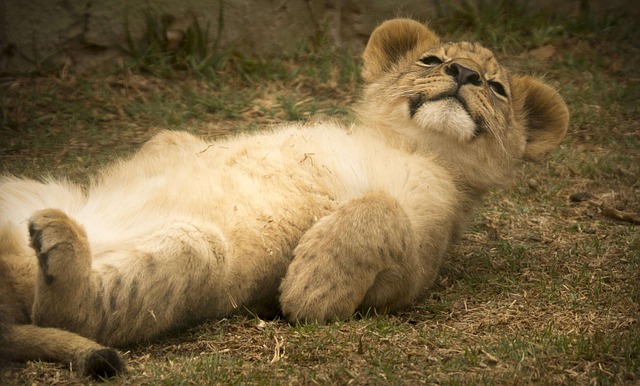For weeks, animal lovers across the country have been wondering what happened to Simba, the lion cub who was found in an Athlone home on August 21. On Wednesday, December 4, CapeNature confirmed that they euthanised the little lion after a Durban journalist publically announced that a reliable source had confirmed the cat was put down on the same day he was “taken to a place of safety”.
“CapeNature has been faced with one of the hardest decisions to make in conservation as a result of the illegal behaviour of three local men. A wild lion cub of approximately four months old was euthanised by a professional veterinarian with CapeNature’s support and sanction,” Loren Povitt, Acting General Manager of CapeNature, said in a statement. “This action is in line with international best practice guidelines as recommended by the IUCN and CITES, with clear guidelines in terms of the disposal or placement of illegally traded or wild animals confiscated during law enforcement operations. CapeNature stands by the decision taken.”
According to the organisation, it carefully considered the options of releasing Simba back into the wild or place it into an institution where the appropriate level of care would be achieved, but these were not found to be viable or “in line with sound conservation principles”.
“In this case it was clear that the cub was treated as a pet and habituated to humans and would be impossible to rehabilitate to a healthy natural behavioural state. Although there are facilities for keeping lions in captivity in the WCP and SA, there are no rehabilitation facilities for lions in SA,” Povitt maintained. “There are no successful cases of lions that have been rehabilitated and successfully released into the wild. In fact, the National Parliamentary colloquium on captive lion breeding and hunting in South Africa – supports this and recommends no more lions find their way into permanent captivity.”
“It must be stressed that CapeNature did not take this decision lightly, and shares the public’s sadness that this was even necessary,” she added.
According to Dr Ernst Baard, Executive Director of Conservation Operations for CapeNature, the organisation has the obligation to look past the indivdual perspective and evaluate what is best for the species overall. “This places CapeNature in the position to sometimes make hard decisions which are not always popular with or understood by the public,” he said.
The three suspects found in possession of Simba are aged 28, 29 and 31, were arrested on August 27, 2019. They appeared in the Wynberg Magistrates Court on November27, on charges of possession of a protected wild animal. Their bail has been extended to February 2020.
“The moment these suspects removed the animal from its natural habitat they issued its death sentence as there was no other viable outcome. This decision, taken with the veterinary physician, was very difficult for CapeNature. We will continue to work alongside the South African Police Service to punish the perpetrators,” Baard said.
Why didn’t CapeNature try other options like rehabilitation or captivity?
Rehabilitation means that the animal will be released back into the wild (into the original habitat/area where he was found). In this case the lion cub was strongly habituated to humans and would be unable to fend for itself in the wild. It will most likely continually seek out human company. The origin of the animal was also unknown, which would make rehabilitation/release back into the wild a problematic option. The success of integrating a very young cub into an established, unrelated lion pride is also very doubtful.
Captivity means the animal would live out his days within confinement. Sending the animal to a place of captivity was not a viable option as CapeNature does not support this in terms of our Ordinance and guidelines / protocols relating to the placement of confiscated wild animals.
“CapeNature received the offer from Drakenstein Lion Park and others, after the lion cub was euthanised, however, it should be noted that there are no approved rehabilitation facilities for lions in South Africa, and that existing facilities where lions can be kept, operate as a commercial ventures where animals are displayed to the public for an admission fee,” Povitt said. “Since the National Parliamentary colloquium, read with our guidelines in such matters, does not support the perpetuation of lions into captive facility nor the deriving of any profit to be gained from seized wildlife, awarding this lion to any commercial facility was not considered a viable conservation option.”
Why not give the lion cub to someone to care for as a pet?
Wild animals, especially large predators, are not suitable as pets and the situation invariably ends badly for the animal. Attacks on humans are not uncommon, notably by lions kept and raised in captivity.
Is there an investigation into the circumstances surrounding the lion’s death?
There have been reports that a charge has been laid against CapeNature with the South African Police Services. CapeNature has not been notified of such action. The court process against the three accused is still underway and as such, there may be ongoing investigative processes relating to this case specifically.
What is CapeNature’s position as the conservation authority for the Western Cape?
In principle, CapeNature does not support the placement of wild animals in captivity.
“We urge members of the public to not remove wild animals out of their habitat (even if you think you are helping), but rather contact CapeNature or your nearest conservation office to assist if you are concerned. By taking a wild animal into your house, you are doing a huge disservice to the animal and the species as a whole; the individual which in all likelihood will become habituated to humans and, based on examples, will never be able to lead a normal life again. Removing an animal from the wild without due authorisation is also a contravention of the CapeNature Ordinance and illegal in the Western Cape,” Povitt said.
Picture: Pixabay

